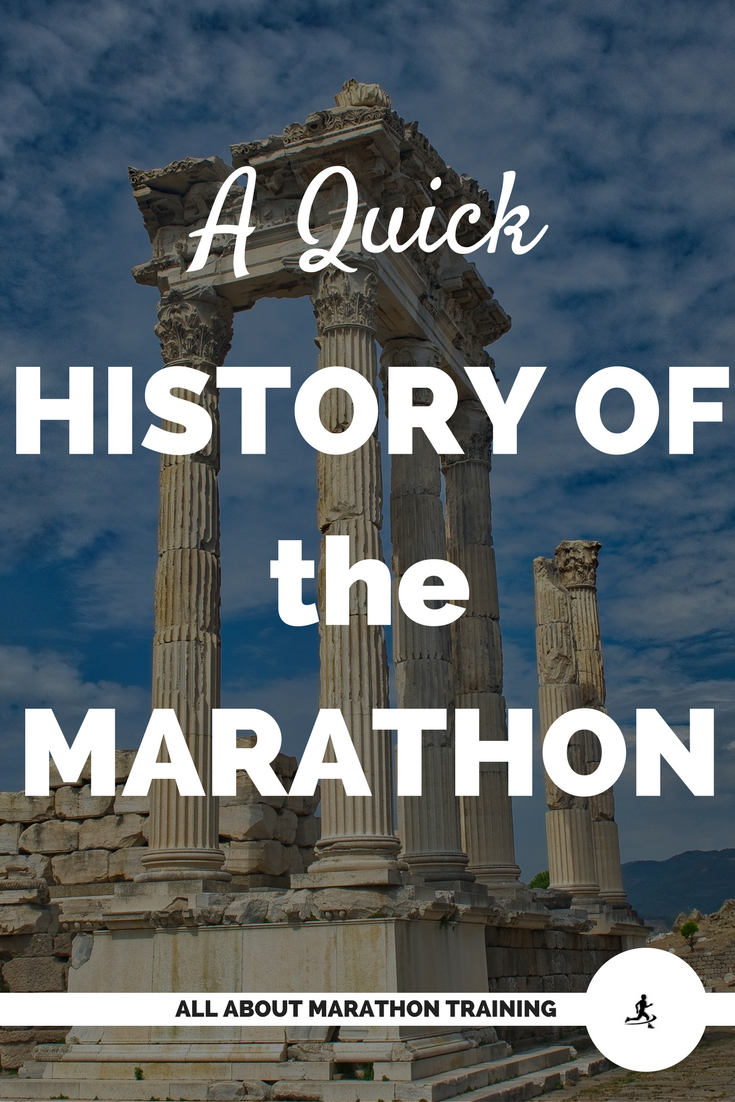
The Marathon: A History Forged in Sweat, Blood, and Legend
The marathon, a grueling 26.2-mile race that pushes the human body to its absolute limits, is more than just a sporting event. It’s a potent symbol of endurance, resilience, and the enduring power of the human spirit. Its history, woven with threads of ancient mythology, military strategy, and modern athletic competition, is as captivating and challenging as the race itself. This article delves into the rich and fascinating history of the marathon, from its legendary origins to its evolution into the globally celebrated event we know today.
The Pheidippides Legend and the Birth of a Myth:
The marathon’s origins are inextricably linked to the Battle of Marathon in 490 BC, a pivotal clash between the Athenian army and the invading Persian forces. The story, recounted by the Greek historian Herodotus, centers on a soldier named Pheidippides, who, according to legend, ran approximately 40 kilometers (25 miles) from Marathon to Athens to announce the Athenian victory. This momentous run, allegedly undertaken with unwavering determination despite exhaustion and potentially fatal injuries, is the cornerstone of the marathon’s narrative. However, the details surrounding Pheidippides’s run are shrouded in ambiguity.
Herodotus’s account, while evocative, lacks definitive proof. There is scholarly debate regarding the precise distance covered, the nature of Pheidippides’s message (whether it was simply the news of victory or a call for reinforcements), and even his ultimate fate. Some historians propose that Pheidippides’s run was part of a relay system, not a single, continuous feat. Others suggest that the story, as presented, might be an embellished version of events, a heroic tale constructed to enhance the glory of the Athenian victory. Despite the historical uncertainties, the legend of Pheidippides endures, casting a powerful shadow over the marathon’s narrative and cementing its place in popular imagination.
The Modern Marathon’s Genesis: Reviving an Ancient Symbol:
The modern marathon emerged not from a direct historical link to Pheidippides’s legendary run but rather from a desire to commemorate the battle of Marathon and its symbolic significance. The 1896 Olympic Games, held in Athens, provided the perfect stage for the marathon’s resurrection. Baron Pierre de Coubertin, the founder of the modern Olympic Games, saw the marathon as a fitting tribute to the ancient Greek spirit and its enduring legacy.
The inaugural Olympic marathon in 1896 was a challenging event, fraught with logistical issues and uncertainties. The route itself wasn’t precisely measured, adding to the overall difficulty. The race featured a diverse group of participants, reflecting the growing international interest in athletic competition. The winner, Spiridon Louis, a Greek shepherd, became an instant national hero, his victory further solidifying the marathon’s connection to Greek national identity.
Evolving Standards and the Standardization of Distance:
The early years of the modern marathon were marked by inconsistent distances and a lack of standardization. The initial race’s distance was not the precise 26.2 miles that we know today. It wasn’t until the 1908 London Olympics that the marathon distance was officially set at 26 miles and 385 yards (42.195 kilometers). This distance was chosen to allow the race to start at Windsor Castle and finish in front of the royal box at the White City Stadium. This somewhat arbitrary decision solidified the marathon’s distance, ensuring consistency in future races.
The Marathon’s Growth and Global Appeal:
From its Olympic beginnings, the marathon’s popularity spread rapidly, transcending national borders and becoming a global phenomenon. Major cities worldwide began hosting their own marathons, each adding its unique character and flavor to the event. The New York City Marathon, the Boston Marathon, and the London Marathon are just a few examples of the iconic marathons that have become major cultural events, attracting thousands of participants and millions of spectators.
The rise of running as a recreational activity further boosted the marathon’s popularity. The marathon transitioned from an elite sporting event to a race accessible to a wider range of participants, including amateur runners driven by personal challenges and charitable causes. This democratization broadened the marathon’s appeal, solidifying its position as a symbol of human potential and endurance.
The Marathon’s Cultural Significance and Ongoing Evolution:
The marathon’s cultural significance extends beyond its athletic competition. It has become a powerful symbol of human endurance, resilience, and the ability to overcome adversity. The marathon’s narrative frequently resonates with themes of personal triumph, perseverance, and the pursuit of challenging goals. The race has inspired countless stories, books, films, and documentaries, reflecting its enduring power and emotional resonance.
The marathon continues to evolve, adapting to modern technology and societal changes. Modern marathons incorporate sophisticated timing systems, advanced medical support, and rigorous environmental considerations. Furthermore, the growth of virtual marathons and other innovative formats demonstrates the marathon’s ability to adapt to changing societal trends.
Conclusion:
The marathon’s history is a rich tapestry woven from legend, historical events, and human ambition. While the precise details of Pheidippides’s run remain debated, the enduring power of the marathon lies in its symbolic representation of human potential and the pursuit of challenging goals. From its ancient mythological origins to its modern-day global appeal, the marathon continues to inspire and challenge runners worldwide, reminding us of the incredible feats that the human spirit is capable of achieving. Its enduring legacy as a symbol of human endurance ensures that the marathon will continue to hold a prominent place in athletic history and popular culture for generations to come.



